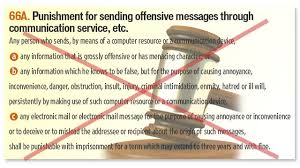In a verdict related to the freedom of speech on the Internet, the Supreme Court on 24th March 2015 scrapped Section 66A of the Information Technology Act, terming it as unconstitutional.
The supreme court said that section 66A is vague and violative of the fundamental right to freedom of speech.
Justices J Chelameswar and Rohinton F Nariman passing the judgement said that 66A the court cannot go by the government’s assurances that the section will not be misused as that cannot be properly implemented because governments come and go but section 66A will exist forever.
The draconian law gives the police the right to make arrests over ‘offensive’ social posts.
Point to Remember:
- Section 66A prescribes the punishment for sending ‘offensive’ messages through computers or any other communication device such as a mobile phone or a tablet.
- The bench, however, did not strike down two other provisions- sections 69A and 79 of the IT Act- and said that they can remain enforced with certain restrictions.
- Section 69A : provides power to issue directions to block public access of any information through any computer resource
- Section 79 : provides for exemption from liability of intermediary in certain cases.
- The first PIL on the issue was filed in 2012 by law student Shreya Singhal, who sought amendment in Section 66A of the Act after the two girls were arrested namely, Shaheen Dhada and Rinu Shrinivasan in Palghar in Thane district as one of them posted a comment against the shutdown in Mumbai following Shiv Sena leader Bal Thackeray’s death and the other ‘liked’ it.
- the apex court had on May 16, 2013, come out with an advisory that a person, accused of posting objectionable comments on social networking sites, cannot be arrested without police getting permission from senior officers like IG or DCP.
- A boy was arrested on March 18 for allegedly posting on Facebook objectionable comments against senior Samajwadi Party leader Azam Khan.
- A petition was filed before the Supreme Court in this regard alleging that its advisory was violated after which the apex court had asked UP police to explain the circumstances leading to the arrest of the boy.
- The bench also referred to two judgments of separate UK courts which reached different conclusions as to whether the material in question was offensive or grossly offensive.
AffairsCloud Recommends Oliveboard Mock Test
AffairsCloud Ebook - Support Us to Grow
Govt Jobs by Category
Bank Jobs Notification





